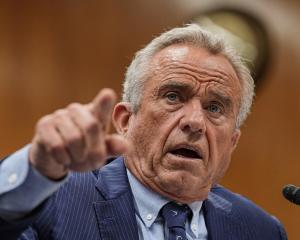
Friday, March 13th, 2020, will always go down as our Black Friday.
Eight colleagues and I were at the TPC Players Championship in Sawgrass, Florida - our first major sport event in what was shaping up to be our most successful year since starting our business 30 years earlier.

We woke that morning to the news that the US President had declared a National Emergency due to the Novel Coronavirus disease. The day before, the PGA had announced that the final three days of the tournament would be without crowds. By 10am that had changed.
The Players Championship was cancelled.
In a matter of weeks, we had lost every sport event we had for the foreseeable future, and we were in lockdown back in New Zealand with the rest of the country.
As I write this column, exactly two years on, we are delivering the live coverage of the TPC Players Championship from our remote studio in Dunedin. We are now doing more sports globally than we could ever have done before Covid and, because we are doing them remotely from Dunedin, all the hi-tech jobs related to this have remained here. We have also reduced our travel carbon footprint by almost 90%.
I can’t for one moment claim that this was part of a well-thought out master plan. There was no plan because things kept changing so fast. But, as I consider this in the context of the Maori proverb, "the footsteps we lay down in the past create the paving stones upon which we stand today", I can see clearly how it is that we are where we are.
From day one we made saving the livelihoods of our people as important as keeping them safe from Covid. Saving Lives and Livelihoods. You simply can’t have one without the other, and once we made that our kaupapa, our reason for doing things, our options became much clearer.
Instead of viewing Covid as a challenge we now saw it for the opportunities it created.
Because we were in uncharted territory everyone’s view, no matter how improbable it may have seemed at the time, was important and needed to be considered. The idea that we could, in a matter of weeks, design a remote system that would mean that we could deliver all our sports products globally without leaving Dunedin was one of those “out there” ideas.
But with borders closing all over the world this was what we needed to do if we were going to have any hope of saving the livelihoods of everyone in our team — our whanau. It was non-negotiable.
Sitting in the studio today watching this amazing team delivering The Players Championship to the world, I realise now that this was never an issue of technology, which I originally thought it was. The technology, as it turned out, was always there. This was all about attitude, and Covid created the opportunity to shift the mindset, the attitude, of people who were focused on the way the world was with Covid, not the way it could be if we broadened our thinking. The way it needed to be if we were to save both lives and livelihoods.
On Saturday, March 14, as we were flying back to New Zealand from the US, our Government moved to close our borders, and the single focus on saving lives was put in train. The Ministry of Health became the lead agency on our Covid response, and the Department of the Prime Minister took control of PR and communications to manage the “messaging”.
We got tag lines like the "team of 5 million", "be kind", and "he waka eke noa — we are all in this together". As with all PR tag lines, they worked — until they didn’t.
The revelation that the Prime Minister’s office has contracted a US company to troll through social media commentary to help them refine their “messaging" should be of concern to us all.
Could this have been the rationale for the decision that saw Kiwis boarding flights out of Australia believing that they were going into self-isolation when they got home only to find that, by the time they had landed, the PM’s office had decided they were free to go anywhere they wanted. Was this an example of health issues being overridden by social media commentary? I imagine the link between the words "cost of living" and "crisis" featured quite significantly in their report to the PM’s office this week.
Even now, as MIQ is being disbanded, we still see it being lauded by Government ministers as the strategy that kept us safe and saved lives. Until it didn’t.
Covid came through the MIQ system, based largely in downtown Auckland, our largest city, against all advice from independent experts at the time who said this posed the highest risk for community transmission when, not if, it got out. An $8 billion lockdown in Auckland that was anything but “short and sharp” — another tag line that went by the way — was not something that happened in hindsight. It was advice that was ignored by those who thought they knew best.
Then there was the sole PCR test that the Government contracted to a Canadian company as “their gold standard”. Until it wasn’t. As a result, we have a community totally confused as to how it is that the rapid antigen tests that the Government banned for over two years as being inaccurate, have now become the new standard for testing — if you can find them.
The Government was warned months ago that the laboratories at the core of their gold standard test would not be able to keep up with demand, but they knew best. Until they didn’t!
Dr Ashley Bloomfield cut a very lonely figure as he stood on his own at the daily press conference admitting he had got that bit wrong. Thrown under the bus leapt to mind as I watched him back down from the Government’s earlier assurance that things were under control.
But it’s not just officials that have felt those tyres run over them. On the day the new online platform for immigration visa applications crashed after just a few minutes of being relaunched, the Prime Minster threw the public under the bus with the observation that they should have expected it and not all gone on at the same time. All 5000 of them!
Sitting here in our remote studio in Dunedin I am watching hundreds of thousands of users on our online platform that allows them to watch every shot of every player on every hole at The Player Championship. It’s not rocket science.
There are countless other examples where a failure has been magically transformed into another example of "look how well we did". Remember when vaccination was such a low priority for the Government that they let an offer from Pfizer go unanswered for six weeks and followed that up by leaving the negotiating teams stranded without a budget! Or when the Government went on its “well-earned Christmas break” leaving an offer for millions of rapid antigen tests go unanswered until they came back from their break — only to find Chinese New Year would put delivery back by weeks.
As I look back on the spin and obfuscation over the past two years I am reminded how it is you boil a frog.
Do it slowly enough and maybe it won’t notice.











